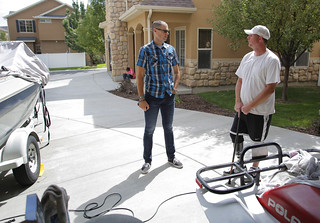By Jim Burton
HERRIMAN, Utah—You’ve looked out the front window of your home and seen them coming. Two young males wearing white shirts and black ties are riding bikes in the neighborhood. When they knock on your door, what do you do?
North American Mission Board (NAMB) missionary Travis Kerns would encourage you to love them. That’s what he has learned to do. His love for Mormons grew to the point that he now lives 35 miles from downtown Salt Lake City and serves as city missionary for NAMB’s Send North America: Salt Lake City.
Kerns has something most Southern Baptists don’t have, a Ph.D. in applied apologetics with a focus on Mormonism from The Southern Baptist Theological Seminary (SBTS). During his undergraduate studies in 1996, he had a class on new religious movements, and Mormonism was the first they studied.
“It took hold of my heart,” Kerns said of the Church of Jesus Christ of Latter-day Saints (LDS). “In school, every paper I wrote was geared toward Mormonism.”
When he began teaching at SBTS in 2007, Kerns started taking students to Salt Lake City. On the flight home after his sixth trip there in 2012, Kerns said there were fires on the mountains. As he viewed the smoke filling the Salt Lake Valley during the plane’s ascent, it became a fresh vision.
“What it said to me was that this city is on fire and burning,” Kerns said. “I just lost it, started crying like a baby.”
Deep Southern Baptist roots
Kerns grew up in Greenville, S.C., where his family attended First Baptist Church of Taylors. He’s the product of missions education, having been a Royal Ambassador.
“I was Baptist born and Baptist bred and when I die I’ll be Baptist dead,” Kerns said.
His dad led him to Christ in their home when he was 9 years old.
“I wasn’t baptized until I was 14,” Kerns said, as his pastor wanted him to be sure of his decision. “I saw a lot of my friends walk the aisle and get baptized and nothing really changed in them. So I didn’t want to do it for the sake of doing it.”
Kerns chose to attend nearby North Greenville University where its president, Jimmy Epting, had a big influence on him. He enrolled as a business major, but that soon changed.
“In my freshman year of college, something in me just clicked, and I fell in love with the New Testament, Jesus and people in the church,” Kerns said.
Being Southern Baptist in upstate South Carolina had its advantages, as there were many relationships and connections. That same dynamic is true for Mormons in Salt Lake City.
“Utah is 70 percent LDS,” Kerns said. “LDS members run the state government. The majority of judges, police officers, firefighters, lawyers, real estate agents and bankers are LDS. Almost everyone here is LDS.”
When Kerns moved into a home with his wife, Staci, and their son, the neighbors already knew it was the “NAMB” house.
“They knew right away we weren’t Mormon,” Kerns said. “Plus, we didn’t show up at the meeting house on Sunday.”
Mormons attend meeting house (comparable to church) meetings based upon their residence. Between Logan and Provo, Kerns estimates there are 4,164 meeting houses or halls.
“It’s so Mormon here, many have never met or heard from anybody who is not Mormon,” Kerns said.
Church planting challenge
Southern Baptists are the largest Protestant denomination in Utah, but the presence is minimal. Most Protestant churches run between 50 and 100 people.
“The hardest part about any Christian church (in Utah) is that the average tenure for pastors is 14 months,” Kerns said. One key to success, he believes, is to keep showing up.
As city missionary for Send North America: Salt Lake City, one of 32 Send North America cities, Kerns oversees church plants in the metropolitan area.
“The Utah-Idaho Southern Baptist Convention has a goal that by 2020 they want to double the number of churches [in the two-state convention],” Kerns said. “That means another 150 churches. We want to be one third of that number, 50 new churches by 2020.”
By 2014, there were 18 active Southern Baptist church plants through Send North America: Salt Lake City, with 12 having started within the year. Kerns spends much of his time mentoring the current church planters while recruiting and assessing future church planters. Utah County, which Kerns calls the cultural capital of Mormonism and the home of Brigham Young University, garners most of his attention.
The cultural challenges translate into logistical challenges. Whereas in most major cities church plants can meet in public schools, that does not happen in Utah.
The new churches spend much money on rent, typically commercial space. The Annie Armstrong Easter Offering® (AAEO) and Cooperative Program (CP) help new churches meet those challenges.
“That money goes directly to our church plants to help them reach people,” Kerns said. “Without CP and AAEO, there would be no Send North America: Salt Lake City.
“There’s been no shortage of resources when I’ve asked. It’s because of the generosity of Southern Baptists.”
Kerns was close to tenure at SBTS when he accepted the call to lead Send North America: Salt Lake City. Through his research, Kerns has built relationships with many LDS leaders.
“In 18 years of doing this, I’ve only seen two people convert from Mormonism to Christianity,” said Kerns who notes that on average it takes from two to seven years for most Mormons to convert, the majority being much closer to seven years. “Being around leaders of the LDS church to share my faith with them drives everything that I do.”
To learn more about the supporting the vital work of missionaries through the Annie Armstrong Easter Offering, visit anniearmstrong.com.
Jim Burton writes for the North American Mission Board.
Published November 5, 2015
